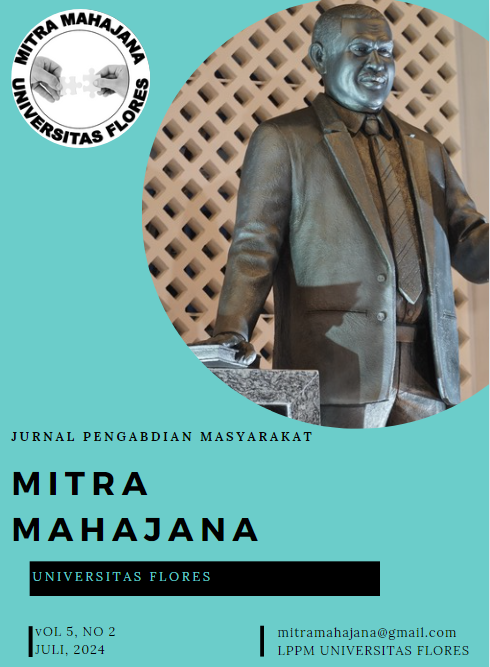PENINGKATAN PENGETAHUAN KESEHATAN REPRODUKSI PADA REMAJA DI SEKOLAH MENENGAH PERTAMA NEGERI 13 JAKARTA
DOI:
https://doi.org/10.37478/mahajana.v5i2.4455Abstract
Reproductive health is a state of complete physical, mental, and social well-being. It does not merely entail freedom from diseases related to the reproductive system, functions, and processes. Maintaining reproductive health is crucial for adolescents through adopting a healthy lifestyle and consuming vitamins. The age range for adolescents is typically between 10-20 years old, though according to the Indonesian Ministry of Health Regulation Number 25 of 2014, adolescents are defined as those aged 10 to 18 years. Adolescence begins with puberty, marked by physical and physiological changes. Reproductive health education should be introduced early, starting around 2,5-3 years old when children begin to be curious about their bodies. Parental education aims to help children understand reproductive health, emphasising the importance of personal hygiene, especially for adolescent girls. This education focuses on awareness and the importance of reproductive health and equipping children to make informed decisions in various situations. Community service initiatives aim to educate adolescents and improve their knowledge of reproductive health. An outreach activity was conducted on Friday, April 19, 2024, at SMPN 13 Jakarta, reaching 380 respondents directly through educational sessions. Evaluation involved pre-test and post-test questionnaires to measure knowledge levels, with results showing a significant increase in reproductive health knowledge among adolescents. Post-test results indicated high scores for 299 respondents (78.69%).
Downloads
Keywords:
health, reproduction, teenagerReferences
Agustina, R. E. (2024). Kesehatan Reproduksi Remaja. Pekalongan: Penerbit NEM.
Azwar, S. (2003). Sikap Manusia, Teori dan Pengukurannya. Yogyakarta: Pustaka Pelajar.
Baroroh, I., & Meikawati, P. R. (2023). Peningkatan Pengetahuan Kesehatan Reproduksi Dan Upaya Pencegahan Kenakalan Remaja Di Posyandu Remaja Gerbang Sehati. Jurnal Pengemas Kesehatan, 2(1), 14-17. https://jpk.stikesbup.ac.id/index.php/jpk/article/view/10
BKKBN. (2011). Keluarga Berencana dan Hubungan dengan kehidupan seksual ekonomi dan budaya. Jakarta: BKKBN
BKKBN. (2012). Survei demografi dan kesehatan Indonesia. Kesehatan Reproduksi Remaja. Jakarta: BKKBN
Fishbein, M., & Ajzen, I. (1977). Belief, Attitude, Intention, and Behavior: An Introduction to Theory and Research. Pennsylvania: Pennsylvania State University Press
Hurlock, E. B. (1994). Psikologi Perkembagan (Suatu Pendekatan Sepanjang Rentang Kehidupan). Jakarta: Erlangga.
Kasim, F. (2014). Dampak Perilaku Seks Berisiko terhadap Kesehatan Reproduksi dan Upaya Penanganannya (Studi tentang Perilaku Seks Berisiko pada Usia Muda di Aceh). Jurnal Studi Pemuda. 3(1). 39–48. https://jurnal.ugm.ac.id/jurnalpemuda/article/download/32037/19361
Mareti, S., & Nurasa, I. (2022). Tingkat Pengetahuan Remaja Tentang Kesehatan Reproduksi Di Kota Pangkalpinang. Jurnal Keperawatan Sriwijaya, 9(2), 25-32. https://doi.org/10.32539/jks.v9i2.154
Notoatmodjo, S. (2007). Kesehatan Masyarakat, Ilmu dan Seni. Jakarta: Rineka Cipta.
Nurhayati, T. S., & Siregar, P. A. (2023). Gambaran Tingkat Pengetahuan Remaja Masjid At-Taqwim Terhadap Kesehatan Reproduksi Remaja. Madani: Jurnal Ilmiah Multidisiplin, 1(6). 665-669. https://jurnal.penerbitdaarulhuda.my.id/index.php/MAJIM/article/view/475
Utami, V. W., & Prastika, M. (2018). Hubungan pengetahuan tentang dismenore dengan perilaku pencegahannya pada remaja putri kelas X dan XI di SMA Gajah Mada Bandar Lampung tahun 2014. JKM (Jurnal Kebidanan Malahayati), 1(1), 5-8. doi:https://doi.org/10.33024/jkm.v1i1.535.
WHO. (2014). WHO, UNICEF, UNFPA, The World Bank, Trends in Maternal Mortality: 1990 to 2013. Geneva: World Health Organization.
Yarza, H. N., & Kartikawati, E. (2019). Pengetahuan kesehatan reproduksi remaja dalam mencegah penyimpangan seksual. Sarwahita, 16(01), 75-79. DOI: https://doi.org/10.21009/sarwahita.161.08
Yulianti, M. (2023). penyuluhan Penyuluhan Kesehatan Reproduksi Dalam Pencegahan Stunting di Desa Darmajaya. Jurnal Pengabdian Kepada Masyarakat Sebelas April, 1(1). https://ejournal.unsap.ac.id/index.php/jpkmsa/article/view/25
Downloads
Published
How to Cite
Issue
Section
License
Copyright (c) 2024 Susi Mulyati, Dian Mahanani, Jhon Hendrik Sahat Marasi Hutapea, Annisa Fakhirah, Gefira Nur Fatimah, Siti Masruroh, Alifah Irdanti Syakuli, Moch Adriansyah, Sabrina Putri Fasa

This work is licensed under a Creative Commons Attribution-ShareAlike 4.0 International License.
The authors and other parties are bound to the Attribution-ShareAlike 4.0 International license (CC BY-SA 4.0 DEED) for the published articles. This permits users to:
Share — copy and redistribute the material in any medium or format for any purpose, even commercially.
Adapt — remix, transform, and build upon the material for any purpose, even commercially.
The licensor cannot revoke these freedoms as long as you follow the license terms.
Under the following terms:
Attribution — You must give appropriate credit , provide a link to the license, and indicate if changes were made . You may do so in any reasonable manner, but not in any way that suggests the licensor endorses you or your use.
ShareAlike — If you remix, transform, or build upon the material, you must distribute your contributions under the same license as the original.
No additional restrictions — You may not apply legal terms or technological measures that legally restrict others from doing anything the license permits.






